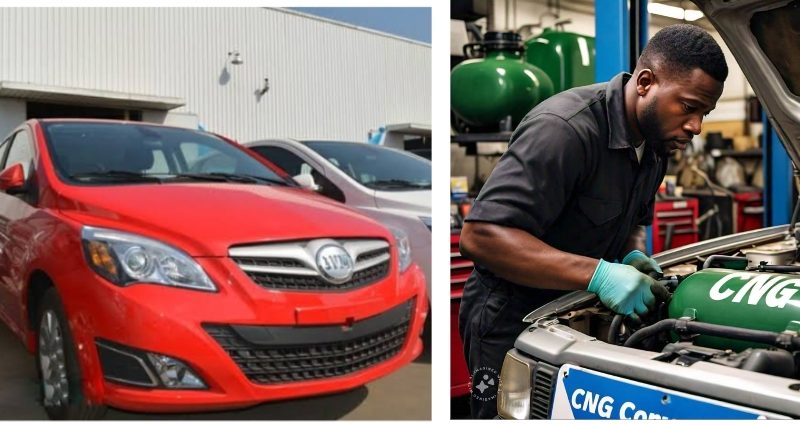Compressed Natural Gas (CNG) vs. Petrol for your vehicles: A Comprehensive Safety Analysis in Nigeria
Perspectives with Dr. Iyke Ezeugo
The surge in fuel prices in Nigeria has led to a wave of vehicle conversions from petrol to Compressed Natural Gas (CNG), with the Nigerian National Petroleum Company (NNPC) promoting CNG as the most viable alternative for cost savings and environmental benefits. For vehicle owners, this rush is largely driven by economic pressures, pushing citizens to seek relief from the unstable and soaring cost of petrol. However, amid the enthusiasm for CNG adoption, there is a concerning lack of information on the associated safety risks. The public is not fully aware of the potential hazards, nor are there assurances regarding the quality of materials used in conversions or the expertise of the technicians performing them.
This study was prompted by the author’s conversation with His Royal Highness Eze Chidiebere Agubuche, UdoHiri 11 of Okpuhu Nkpa Autonomous Community, which highlighted growing public concerns regarding the rapid conversion of vehicles from petrol to Compressed Natural Gas (CNG) in Nigeria. The conversions are largely driven by the escalating cost of petrol, but have raised alarming questions about overlooked safety hazards and precautions. The study investigates the risks associated with CNG conversions and highlights the need for comprehensive guidelines and regulations.
While the NNPC promotes CNG as a solution to Nigeria’s fuel crisis, the conversion process itself may carry hidden dangers if not executed properly. With many vehicle owners resorting to uncertified workshops and substandard conversion kits, the risks of accidents, explosions, and vehicle damage rise exponentially. This article seeks to explore the safety risks involved in converting vehicles from petrol to CNG, compare the relative safety of both fuels, and highlight the infrastructural and regulatory deficiencies that must be addressed to ensure public safety.
Infrastructure Deficiency and Vehicle Compatibility
Nigeria’s fuel infrastructure is heavily tilted towards petrol, with refueling stations easily accessible throughout the country. In contrast, CNG infrastructure is underdeveloped, limited to a few stations in major cities, with minimal presence in rural areas. This limited availability poses a major inconvenience for CNG users, especially those traveling long distances, who may struggle to find refueling stations.
Most vehicles in Nigeria are originally designed for petrol, which necessitates extensive modifications for CNG conversions. Unfortunately, many of these conversions are performed by technicians lacking proper certification or expertise. As a result, improper installations are common, raising the risks of gas leaks or explosions. The growing number of vehicle owners opting for low-cost CNG conversions, without fully understanding the safety implications, has increased the likelihood of catastrophic incidents.
Road Conditions, Heat Sensitivity, and Accident Risks
1. CNG: High-Pressure Storage and Heat Sensitivity
CNG is stored at high pressures—between 3,000 and 3,600 psi—making it highly sensitive to heat. Nigeria’s tropical climate, with its intense heat and exposure to direct sunlight, can exacerbate this issue, leading to a dangerous increase in internal pressure within CNG cylinders. In extreme cases, this can result in cylinder ruptures or explosions.
Additionally, Nigeria’s poorly maintained roads pose a significant risk to CNG vehicles. The constant galloping and shocks caused by rough road conditions can damage CNG cylinders or their connections, potentially leading to leaks or system malfunctions. Proper installation, regular inspections and maintenance are essential to mitigate these risks, but the lack of certified technicians and appropriate tools in Nigeria further compounds the danger.
2. Petrol: Flammability and Explosion Risks
Petrol, on the other hand, is highly flammable but not stored under high pressure, making it less prone to explosions. However, petrol spills during accidents can ignite rapidly, leading to fires that are difficult to control. The ignition temperature of petrol vapors is around 246°C, making petrol-powered vehicles susceptible to fires, but the risks of large-scale explosions are lower compared to CNG.
Conversion Risks, Maintenance Challenges, and Installation Standards
One of the critical safety concerns with CNG conversions in Nigeria is the lack of strict adherence to safety protocols, and poor regulatory services. Vehicle owners often rely on uncertified technicians who may lack the knowledge and skills to handle high-pressure systems safely. This has led to widespread reports of weak connections, improperly installed cylinders, and faulty pressure regulation systems, all of which significantly increase the risk of accidents.
In countries with advanced CNG programs, such as India and Argentina, factory-fitted CNG systems are commonly used, providing a much higher level of safety and reliability. Nigeria, however, relies heavily on aftermarket conversions, which are more prone to failure and accidents. Furthermore, the maintenance of CNG systems requires specialized knowledge, particularly for high-pressure components, which many Nigerian mechanics are not adequately trained to handle at the moment.
Regulatory Gaps and Governmental Support
Successful CNG adoption in countries like India and Brazil is largely due to strong regulatory frameworks that ensure safety standards are strictly enforced. Installation by the call manufacturer gives additional comfort as they follow a strict total quality management system, and have the additional obligation to protect their brand image. These nations also benefit from government support in the form of subsidies, as well as widespread infrastructure that makes CNG a convenient and practical option for drivers.
In contrast, Nigeria’s regulatory environment for CNG is weak, with minimal enforcement of safety standards. As a result, many conversions are performed in unsafe conditions, and there is little oversight to ensure that vehicles meet the required safety criteria. Without adequate regulation or government investment in CNG infrastructure, Nigerian drivers are left vulnerable to the risks of substandard conversions and unsafe fuel systems.
Comparative Analysis: Which is Safer?
Explosion and Fire Risks
– Petrol: More prone to fires, especially during accidents involving spills, but explosions are rare unless petrol vapors accumulate in enclosed spaces.
– CNG: The high-pressure nature of CNG storage makes explosions a more significant risk, particularly if the cylinder is compromised during an accident.
Accident Scenarios
– Petrol: Fires are the primary hazard, but they tend to be localized and easier to contain compared to CNG explosions.
– *CNG*: Accidents involving CNG vehicles are far more dangerous due to the potential for high-impact explosions, which can result in greater damage and casualties.
Heat Sensitivity
– Petrol: While it can ignite in extreme temperatures, petrol is less prone to pressure-related issues compared to CNG.
– CNG: Much more sensitive to heat, especially in hot climates like Nigeria’s. Increased pressure inside the CNG cylinder can lead to dangerous outcomes if not properly monitored.
If you must Convert Your Petrol Vehicle to CNG: consider this Safety Guide
Compressed Natural Gas (CNG) conversions have gained popularity in Nigeria due to their cost-effectiveness and environmental benefits. However, safety concerns require careful consideration.
CNG Conversion Kits:
Two primary types of kits exist:
1. Venturi Kits: Cheaper and easier to install, using the venturi effect to mix air and CNG.
2. Sequential Injection Kits: Offering better performance and efficiency through direct CNG injection into engine cylinders.
Safety Considerations:
– Reports of substandard cylinders and kits highlight the importance of choosing high-quality kits from reputable manufacturers.
– Improper installations or substandard equipment increase accident risks.
– CNG vehicles have safety features like reinforced tanks, but awareness of potential hazards and proper incident response are crucial.
Incident Response Precautions:
– Exercise caution when responding to CNG vehicle incidents.
– Follow specific guidelines, such as using thermal imaging cameras and combustible gas meters.
Notable Incident:
On February 15, 2024, a CNG-powered semi-truck caught fire in Los Angeles, California, injuring nine firefighters.
Selecting a CNG Conversion Kit:
Consider:
– *Compatibility: Ensure kit compatibility with your vehicle’s make and model.
– *Quality*: Choose reputable manufacturers.
– Storage Capacity: Assess CNG cylinder size and space impact.
– Safety Features: Look for leak detection and automatic shut-off.
Ensure Safe Conversion:
Consult certified CNG installers and follow local regulations.
By prioritizing safety and choosing reputable services, you can
minimize risks and enjoy the benefits of CNG conversion.
Conclusion:
While CNG offers potential cost savings and environmental benefits, *the safety risks associated with high-pressure storage, improper conversions, and inadequate infrastructure make it a more hazardous option than petrol in Nigeria’s current environment.* The country’s regulatory gaps, poorly maintained roads, and shortage of qualified technicians exacerbate these dangers, putting drivers and passengers at risk.
For CNG to become a safer and more viable alternative, Nigeria must invest in developing its infrastructure, enforcing stringent safety regulations, and training certified technicians, or insisting that it’s either factory-fitted or nothing so as to hold the vehicle manufacturers accountable. Until these measures are fully implemented, petrol remains the safer and more practical fuel choice for Nigerian drivers. Safety, especially in an environment fraught with infrastructural, quackery in technical services, and regulatory challenges, should always be the top priority when considering a shift to new fuel technologies.
Dr. Iyke Ezeugo is a Forensic Researcher, a Social Impact Expert, and Satirist who uses his perspectives and parodies to challenge the status quo, spark debates, and inspire fresh perspectives on public affairs through insightful intellectual injections._




